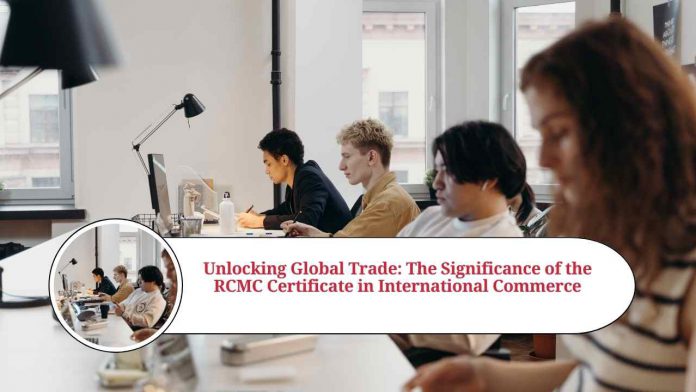Introduction:
In the globalized world of international trade, it is essential for businesses to comply with various regulations and certifications to ensure smooth operations and maintain credibility. One such crucial document is the Registration-Cum-Membership Certificate (RCMC). In this blog post, we will delve into the significance of the RCMC certificate, its purpose, and the benefits it offers to businesses involved in international trade.
What is RCMC?
The Registration-Cum-Membership Certificate (RCMC) is a document issued by Export Promotion Councils (EPCs) or Commodity Boards in India. It serves as proof of registration with these organizations and represents the membership of a particular exporter or importer in a specific product category. The RCMC certificate acts as a validation of a company’s status as an authorized participant in international trade.
Purpose of RCMC Certificate:
The primary purpose of the RCMC certificate is to enable businesses to avail various benefits, incentives, and support measures provided by the government and trade bodies. It also acts as a tool for monitoring and regulating the export and import activities of different industries. The RCMC certificate helps in maintaining a database of exporters and importers, promoting specific industries, and gathering statistical information for policy formulation.
Benefits of RCMC Certificate:
- Availing Export Incentives: Export Promotion Councils and Commodity Boards offer several incentives and schemes to promote exports. With an RCMC certificate, businesses become eligible to claim these benefits, such as duty drawback, duty-free imports for manufacturing, export promotion capital goods scheme, etc.
- Access to Trade Facilitation: RCMC certificate holders enjoy preferential treatment and streamlined processes at customs checkpoints, ports, and other international trade facilitation points. It helps in reducing paperwork, expedite clearance, and enhance overall efficiency.
- Participation in Trade Fairs and Exhibitions: Many trade fairs, exhibitions, and buyer-seller meets require participants to hold a valid RCMC certificate. This certificate allows businesses to showcase their products and services on a global platform, fostering networking and business opportunities.
- Obtaining Financial Assistance: Financial institutions and banks often require an RCMC certificate for businesses to access trade-related financial facilities, including export credit, working capital loans, and export insurance.
- Market Promotion and Brand Building: The RCMC certificate demonstrates a company’s commitment to international trade standards and regulations. It enhances credibility and helps in establishing a strong brand presence in the global market.
- Access to Market Intelligence: Export Promotion Councils and Commodity Boards provide valuable market intelligence and trade data to their registered members. This information assists businesses in making informed decisions, exploring new markets, and identifying potential buyers or suppliers.
Application Process for RCMC Certificate:
To obtain an RCMC certificate, businesses need to follow these general steps:
- Identify the Relevant EPC or Commodity Board: Determine the appropriate Export Promotion Council or Commodity Board based on your product category or industry.
- Application Submission: Complete the application form provided by the selected organization, including the necessary details and supporting documents as specified.
- Payment of Fees: Pay the required fees along with the application. The fee structure may vary depending on the organization and the nature of the business.
- Verification and Approval: The concerned organization will verify the application and documents submitted. Once approved, they will issue the RCMC certificate to the applicant.
Conclusion:
In the competitive landscape of international trade, the RCMC certificate serves as an indispensable tool for businesses to establish their credibility, access benefits and incentives, and navigate the complexities of global markets. By obtaining this certificate, exporters and importers can unlock a range of opportunities, foster growth, and contribute to the overall development of the economy.
Read more useful content:
- Occupancy Certificate Online
- ETA Certificate
- Model Approval Certificates
- Legal Metrology Certificate
Frequently Asked Questions (FAQs)
What is an RCMC certificate?
An RCMC certificate is a Registration-Cum-Membership Certificate issued by Export Promotion Councils (EPCs) or Commodity Boards in India. It serves as proof of registration and membership in a specific product category for exporters and importers.
Who issues the RCMC certificate?
Export Promotion Councils (EPCs) and Commodity Boards are authorized to issue RCMC certificates to eligible businesses.
Why is an RCMC certificate required?
The RCMC certificate is required to avail various benefits, incentives, and support measures provided by the government and trade bodies. It also helps in monitoring and regulating export and import activities.
How long is an RCMC certificate valid?
The validity of an RCMC certificate varies, but it is typically valid for a period of one to five years. After the expiry, businesses need to renew their certificate.
Can an RCMC certificate be transferred?
No, an RCMC certificate is non-transferable. It is specific to the registered exporter or importer and cannot be transferred to another entity.
Can an exporter have multiple RCMC certificates?
Yes, if a business is engaged in multiple product categories, it can obtain multiple RCMC certificates, with each certificate representing a specific product category.
Can an importer obtain an RCMC certificate?
Yes, importers can also obtain an RCMC certificate if they are registered with the relevant Export Promotion Council or Commodity Board. The certificate demonstrates their authorization to engage in import activities.
Are there any fees associated with the RCMC certificate?
Yes, businesses are required to pay a fee while applying for an RCMC certificate. The fee structure may vary depending on the organization and the nature of the business.
Can an RCMC certificate be cancelled?
Yes, an RCMC certificate can be cancelled under certain circumstances. Non-compliance with regulations or fraudulent practices may lead to the cancellation of the certificate.
Is an RCMC certificate mandatory for all exporters and importers?
An RCMC certificate is not mandatory for all exporters and importers. However, it is highly beneficial for businesses involved in international trade as it provides access to various incentives, trade facilitation measures, and market promotion opportunities.




















